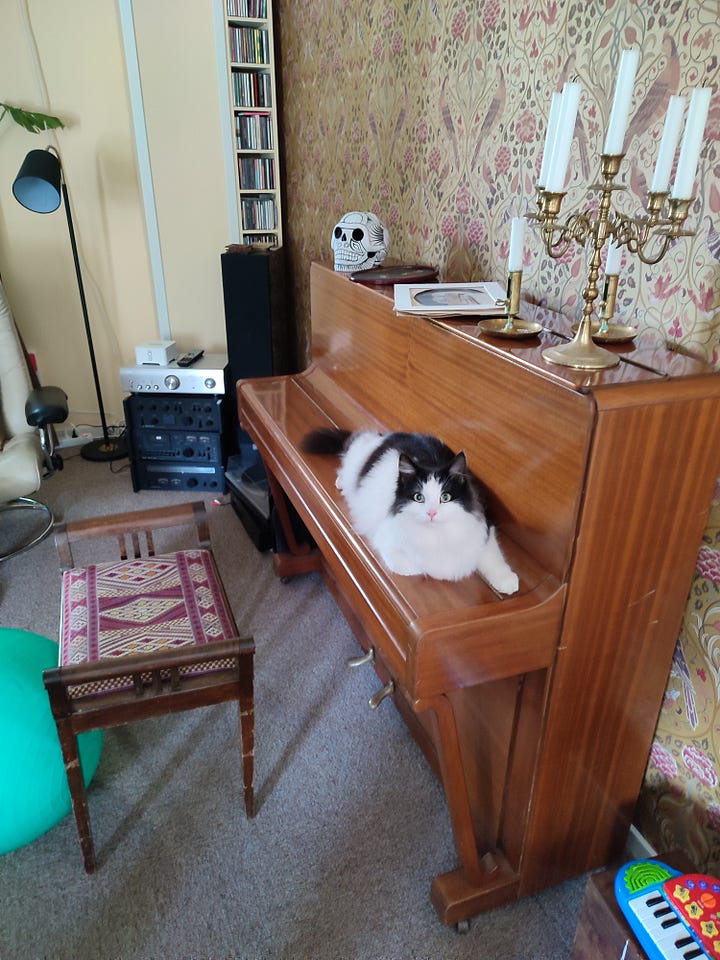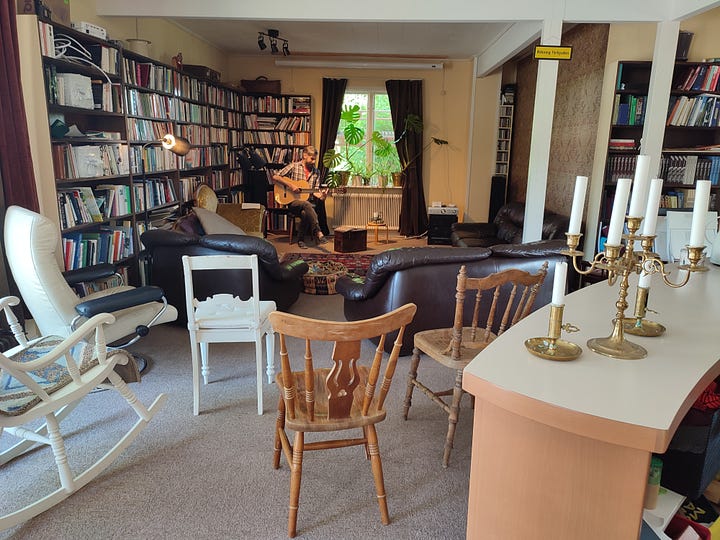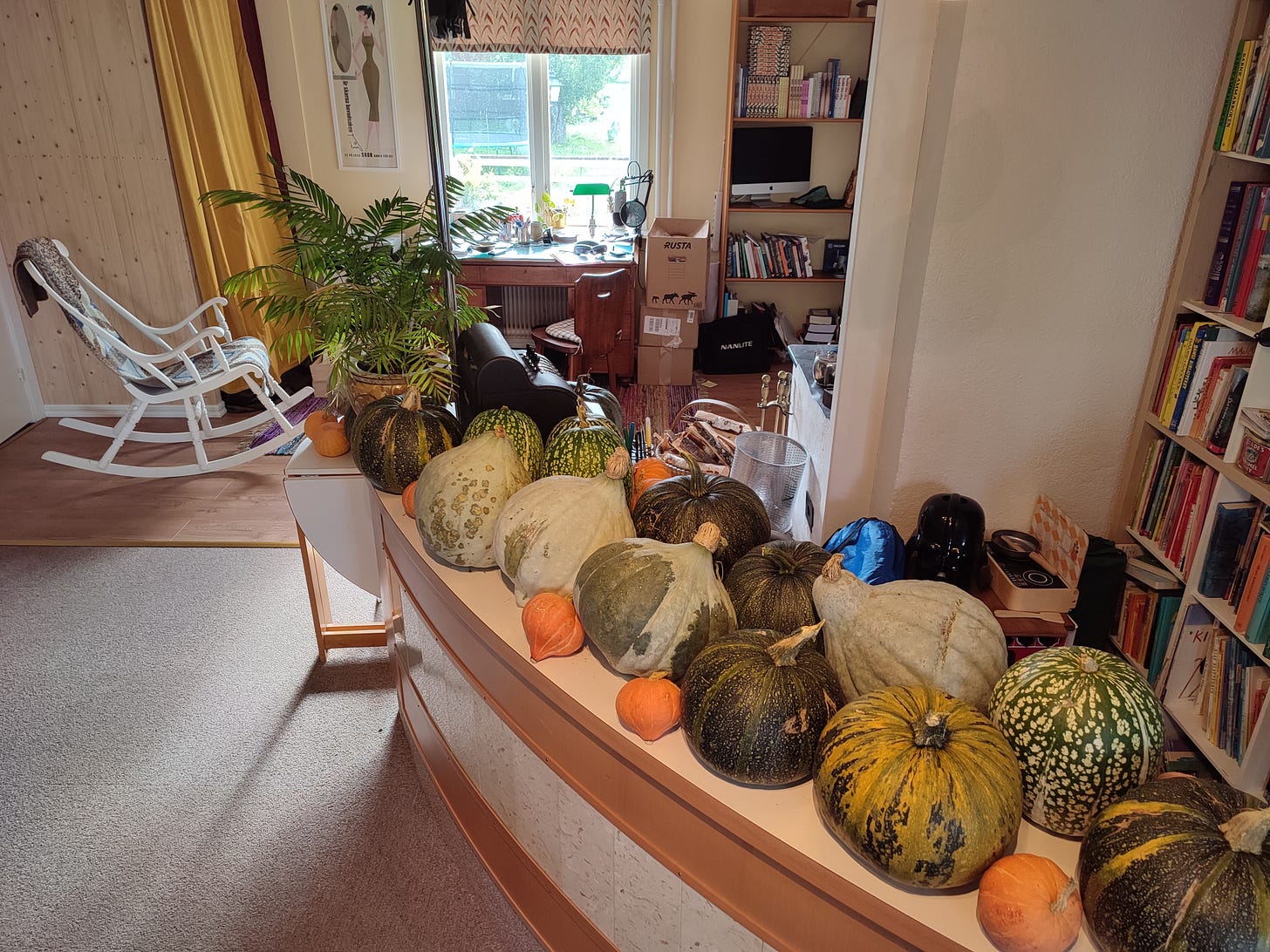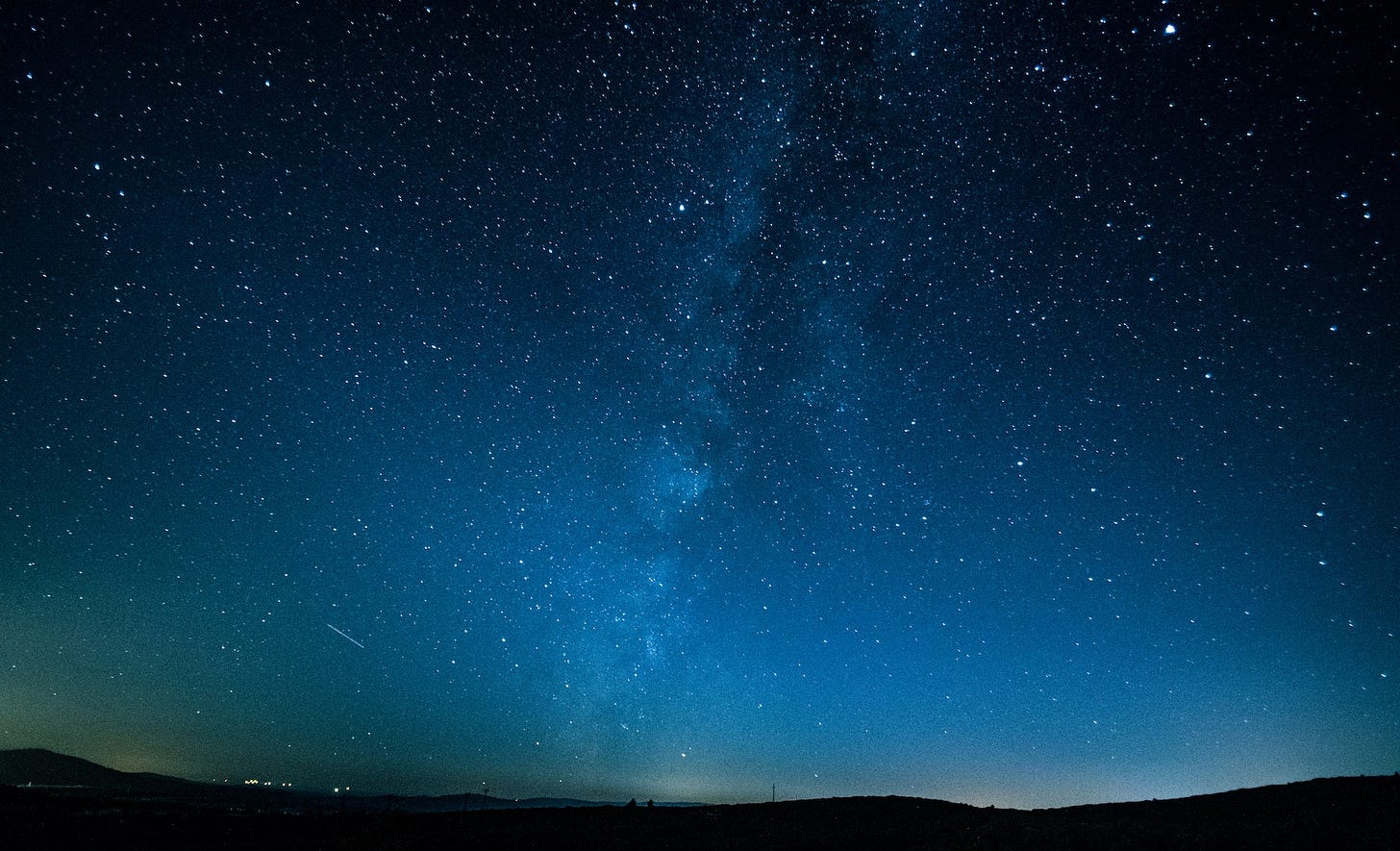I live above a shoe shop in a small Swedish town. The last shoes were sold here in 2015, when the shop closed after more than a century, though there were still dozens of unsold pairs stashed about the house when we moved in. Today, the shoe shop has become a gathering place, where we host workshops or put on small concerts. And in between times, I share it with the pumpkins.
Most of my writing is done at the desk by the window, looking out over the garden. The desk belonged to my great grandfather. It travelled to Sweden in the back of our friend Jack’s van, when he came over on the ferry from Hull in the summer of 2021 for our first season working on the Red House, the big wooden barn that you can see from the window. That June, the Covid restrictions made driving up through Germany impossible, so the only way that Jack could get himself and his tools here was by the freight ferry to Gothenburg. But a craftsman’s van and tools don’t count as freight, so bringing the desk from my parents house in Wisbech became the official purpose for his journey.
At first, the desk lived in the Red House, in the summer bedroom where I wrote the final draft of At Work in the Ruins, a book about the cost of coming to our senses and finding our place in the time of climate chaos and the rest of the trouble that the world is in. Then, in July this year – the week when
and came to visit – we bought an old piano for the price of a Starbucks coffee, on the condition that we could get it home ourselves. So we borrowed a trolley resembling an oversized skateboard and wheeled the piano through the streets, rushing to carry it in the door as a thunderstorm rolled in. And in the musical chairs and tables and everything else that was started by the arrival of the piano, my old IKEA desk was evicted to the Red House and my great grandfather’s desk finally found its home in the shoe shop.

They say that when you get an influx of new readers, it’s a good idea to reintroduce yourself. A warm welcome, then, to those of you who arrived through the interview Britt Wray did with me for
or the debate article Anita Goldman wrote for the Swedish newspaper Dagens Nyheter which does an excellent job of summing up the argument of At Work in the Ruins. (This may be a good moment to mention that I’m looking for a publisher for a Swedish translation of the book.)This is Writing Home, a series of letters and essays, a structure for the questions I find myself carrying, maybe even a hearth around which we can gather. Most of the words you’ll read here are written from that old desk in the old shoe shop in the small Swedish town that is slowly become home to me and my family. It all started quietly, with a turn in the road:
Let’s try this, as an opening claim: to be homeward bound is to have turned aside, to have left the big path, the one big path that was meant to lead to the future; no longer to be in service to its promises, and to ask what else is worth doing with the time we may have left.
Among the things I’ve found worth doing lately, I’ve been at work on an essay series called Into the Deep (1, 2) that is a reckoning with my ongoing relationship with the faith tradition into which I was born and the ways that I find it speaking to me in these unravelling times. The next essay in that series is coming in a week or two.
There’s also an invitation coming up to this autumn’s offering from a school called HOME, the international side of the work that Anna and I do from the old shoe shop here in Östervåla. This will be a five-week series of talks and discussions; a chance to explore what we talk about as ‘the work of regrowing a living culture’ and to meet others who are drawn to this work; and a pathway into the ongoing community that has grown up around our school.
Meanwhile, this week, I wanted to share with you a passage from the book. As part of the exhibition Säg att du är en skog, Anna and I recently translated this passage into Swedish, so if you’d prefer to listen to me reading the translation, you’ll find it here.
Otherwise, read on – and thank you for reading.
DH
To Gather the Embers
from Chapter 4 of At Work in the Ruins (Chelsea Green, 2023)
One evening in the first days of 2020, between the headlines of Australia burning and an assassination in the Middle East, my partner sees a story about a meteor shower that’s due. Outside, the sky is clear and I catch sight of one straight away, a bright flash travelling across the sky, like a silent firework. So we pull out the sun-lounger from my in-laws’ conservatory and lie under blankets, staring up. While we wait, my son wants to be told the names of the constellations. He’s not yet five but he knows there are two names for everything, Swedish and English, even when these are only two ways of pronouncing names older than the languages we speak: Orion, Taurus, the Pleiades. It was the novelist Alan Garner who told me there’s new research on the resemblance between the Greek constellations and the figures seen in the sky by Aboriginal people in Australia; the similarities are strong enough to hint at common threads of myth leading deep into prehistory, stories carried out of Africa.
‘How does it work when you wish on a falling star?’ my son wants to know. ‘Does the thing you wish for just pop up, out of the ground?’ His eyes are wide with recent memories of Father Christmas and the cartoons he’s been getting to watch on his grandparents’ TV. Suddenly I understand why he was so keen on this impromptu astronomic outing.
‘I’m going to wish for a Paw Patrol fire engine,’ he announces.
I don’t know how to disentangle myself or my family from this way of being, this web of extraction that surrounds us with objects that seem to pop up, magically, out of the ground. I don’t even know how to frame the question, how to name the work that’s called for. It’s not a problem, I remind myself, it’s a predicament.
One thing I know that helps – one piece of the work – is to gather and share the embers of other ways of being, blowing them gently into flame together, knowing how much unfinished history we bring to such encounters. As I listen to those who have more experience than I do of the ways life has been made to work in other times and places, one theme I hear is how much work goes into making a grown-up. It’s not something you become by virtue of surviving childhood or sitting out enough years in schoolrooms and lecture theatres. When the time comes, it takes a work of initiation on which much of the life of your community is focused. You have to be cooked in the flames, I’ve heard it said, and the frame of initiation which your culture builds is the vessel that gives you a chance of coming through the fire.
Among the stories and skills acquired in such a process, among the experiences described by those who have gone through it, a common element is some form of ritual death. On the threshold of becoming a grown-up, you are taken through a staged encounter with your own mortality, an encounter which is taken with the utmost seriousness. I’m thinking about this and about the clumsy, risk-filled encountersthat bridged this gap as my friends and I stumbled into adulthood, and a thought comes: so that you do not meet your death for the first time, when it comes for real.
To be a grown-up, it seems to me, is to live alert to consequences, to know the cost of your living. It is hard to be a grown-up in the world that we have made. The cost is almost unbearable. No wonder our culture seems built to keep us distracted, to postpone the encounter with consequences until the last possible moment.
If I insist that we have a lot to learn from the ways in which people have made life work in other times and places, this is not to romanticise the lives of others. There is no way back, nor would we want one. The lives of our ancestors were hard in ways we do not like to think about – for this reason, they could not afford the kind of carelessness to which we have been accustomed. Cushioned on millions of years of fossil energy, veiled by the impersonal logic of commodity exchange and the Emerald City magic of the shop window display, the level of detachment from consequences which has been normal, even necessary, for participation in our death-fuelled societies of consumption was until quite recently the preserve of mad emperors. Our ancestors could not afford this carelessness – and nor, it turns out, can we.
from At Work in the Ruins (Chelsea Green, 2023)





Dougald, this piece speaks to me most powerfully; how to best transport what is precious, be it your great grandfather's desk, your old piano, or how to move ourselves toward what is worth doing in these unravelling times. And all are conveyed to us, your reader-allies, from above a shoe shop where you, your family and your community are walking together with the question of 'what else is worth doing with the time we may have left'. I love this metaphor of how to move what is precious, so beautifully transported in your writing. Warmly, Val
Dougald, I wrote briefly on the star-stories theory last Matariki (Matariki is our Māori New Year, signified by the rising of the Pleiades / Matariki in Midwinter)
https://rosiewhinray.substack.com/p/star-stories-and-oral-history